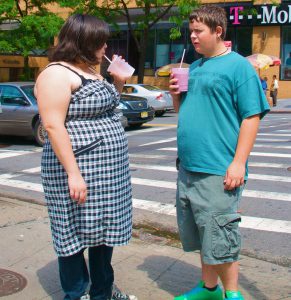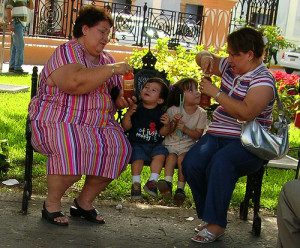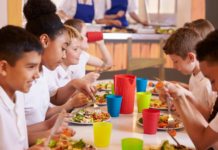Starting from mid-October on, our shortened days and cold weather bring us many festivals and holidays. It seems like every month in traditional American households has its own major holiday. Halloween, Thanksgiving, Christmas/Hanukkah, New Year’s, and Valentine’s Day all have one major thing in common — an excess of sugar and calories. This season of overdoing it harms no one more than our children, still learning their eating habits. Will we teach them healthy eating skills in this formative time?
In a world with more and more people — particularly kids — suffering from diabetes, obesity, heart disease, and cancer, the odds are staggeringly high and never in parents’ favor. It’s easier to educate them on how not to smoke — avoid cigarettes. (We hope they will heed this important advice!) However, one can never avoid eating. All evidence strongly suggests American eating habits are broken. What can we do?

I certainly don’t want my kids to have the life-long struggle with their weight that I do, and the health problems that go along with obesity. Unhealthy eating is a learned behavior. (The United States’ abundance of fatty and sugary food is tempting even the most devout food hippie.)
Even though we are predisposed to like sweets and fatty foods as a mechanism against potential starvation, we’re meant to eat those foods in concert with other, healthier foods. There is no innate instinct that tells the child they are owed candy; this is learned from their environment. It is our job to teach them what is appropriate and normal.
Prevention is much easier than unlearning a bad habit. However, it’s not too late if a habit is already formed. People (and kids in particular) are designed to learn and adapt. They may be loud and resistant in doing so, but the stakes are high enough to warrant the effort.
As study upon study indicates the seriousness epidemic of the growing amount of sugar in our diets and how it directly negatively impacts our health, many families are choosing to limit the extraordinarily excessive amounts of sugar.
Though I am in no means a medical professional, I offer the following suggestions on limiting holiday sugar:
Educate your children
Let them know what to expect and the available choices. Teach them that your family avoids certain foods, and what they can have instead.
Substitute and moderate
Humankind bonds over food. Every culture throughout history has a history of feasts during holidays. It’s hard to be the odd kid out when everyone else is celebrating with food. Go to a healthy grocery store and stock up for special occasions, so you can be ready to substitute healthier options for sugary snacks as needed.
Eating candy in moderation won’t hurt an already-healthy child, though you should ask your doctor what a moderate amount is for your children. In fact, it can help them belong to an integral part of their community during the holidays.
Giving candy is very ingrained in American culture. For example, on Valentine’s Day 2013, my preschoolers received 93 packs of candy combined.
Ninety-three. Literally.
Most were made solely out of GMO high-fructose corn syrup, red 40, and not much else. While I’m thankful for the sweet thoughts of preschool classmates and the camaraderie of the holiday, the fact is that no full-sized, healthy, young adult should eat even close to that amount … much less a small but growing body. Not to mention the ripple effect from an active mind learning it is okay to indulge in utter extreme gluttony. We swiftly distracted and moved the candy out of sight, replacing it with several organic lollipops. Everyone remained happy.
In addition, there are many alternatives to white sugar when baking. You can substitute applesauce, agave nectar, coconut flour, maple syrup, honey, and others.
Walk the walk
We can’t expect our children to heed our words if our actions don’t match. Children are designed to learn good decision-making from emulating their families and communities. Try and be the person you want them to grow up and be — including in your food choices.
Teach graciousness
As previously mentioned, eating is a highly social activity, especially at the holidays. Young children can be very literal; if you tell them that certain foods are potentially harmful, they may become upset if a loved one offers them that food. Be clear that people giving them these things are doing so out not out of ill will, but out of love. As needed, smile and politely say “no, thank you.”

If your family has a specialized diet, whether through your own choosing or because of other dietary issues (such as gluten intolerance, diabetes, or allergies), be considerate and respectful while explaining your restrictions to others, especially those who may be apt to give your children inappropriate treats. Offer to help them out if you are so inclined.
For example, if you plan on trick-or-treating door-to-door on Halloween, offer to help your neighbors by purchasing appropriate treats for them to hand out to your kids. After all, their participation in the holiday is voluntary. It is a kindness to help them out, or to respectfully understand if they are unwilling or unable to support your choices. (Of course, schools are different, as they have legal obligations to protect all children with allergies.)
Though most will understand the reasons for your dietary choices, it is not uncommon to have an adult tease you or even your child. They may not be motivated by malice, but rather by concern that you may be going to extremes. Try and remember this is another built-in protection that humanity has for itself — the encouragement of a norm can be a strong survival mechanism. (Though certainly many go too far and may be judgmental). Our children are watching us to see how we respond. Show forgiveness to those who taunt, no matter their motive.
Sadly, it is a cold hard fact that everyone is going to experience teasing sometime in their lives, most likely multiple times. Teach your children from the beginning the appropriate ways to handle this. They will be better prepared to deal with teasing and/or bullying as they become teenagers, as the virtual world exponentially expands, or as they are faced with peers trying to pressure them into trying drugs. (Another extremely unhealthy habit!)
Cultivate a balanced lifestyle
Eating well is just one part of a bigger equation of all health. Physical wellness does not exist in a vacuum: It is only sustainable when the whole self is nourished.
Encouraging your family to exercise together can be a great bonding experience. Participate as a family in Operation Buyback, where you donate excess Halloween candy to soldiers in combat, and maybe even get a dollar or small prize for your efforts. Try a family walk at sunset over the Lake Murray Dam for some excellent family time!
Putting down our devices and having a face-to-face conversation about the history of the holiday is wonderful for keeping our cognitive skills sharp for mental health. Volunteer together for spiritual health. Having a family sing-along of favorite holiday songs to promote social health.
See the bigger picture
For parents who are interested in learning more about sugar, I highly recommend the following documentaries: Our Supersized Kids and Fed Up. For a broader overview of healthful eating and drinking, I recommend Forks Over Knives and Tapped. I also highly recommend jumping on YouTube and searching for the speeches of Dr. Vandana Shiva, an environmental activist from India.
How do you manage your child’s food choices during the holidays? Will you monitor their candy bags on Halloween?














